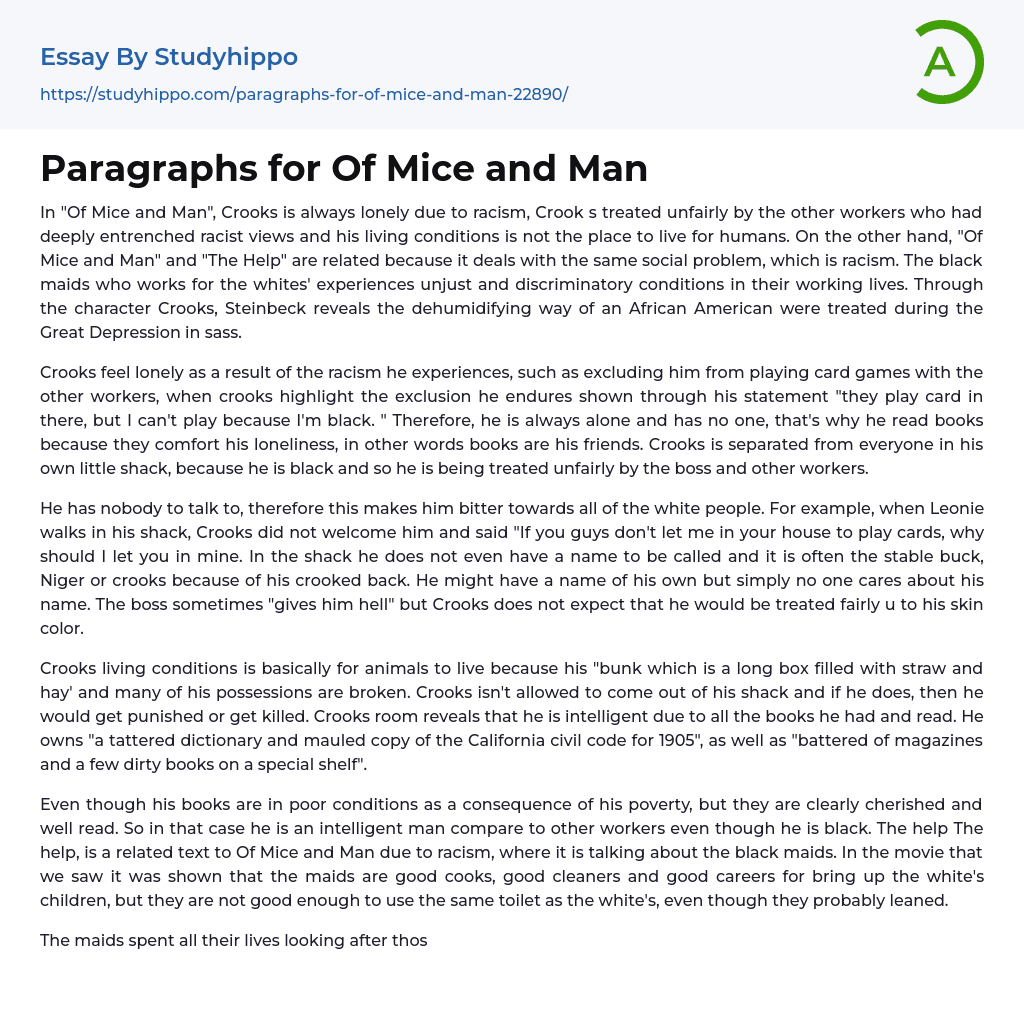Crooks, the character in "Of Mice and Men," constantly experiences loneliness as a result of racism. He is treated unfairly by his fellow workers who possess deeply embedded racist beliefs, and his living conditions are far from suitable for human habitation. In contrast, both "Of Mice and Men" and "The Help" address the issue of racism. The black maids working for white families endure unjust and discriminatory treatment in their professional lives. By showcasing the character of Crooks, Steinbeck sheds light on the degrading treatment endured by African Americans during the Great Depression of the 1930s.
Crooks feels isolated due to the racism he faces, evident in his exclusion from card games with his peers. His exclusion is emphasized through his own statement, "they play ca
...rds in there, but I can't play because I'm black." Consequently, he remains perpetually alone with nobody to rely on. This is why he turns to books as companions to alleviate his isolation. Crooks is segregated in his own tiny shack because of his race, subjected to unfair treatment from both the boss and his co-workers. With no one to talk to, he harbors bitterness towards all white people. When Lennie enters his shack, Crooks refuses to welcome him and remarks, "If you guys don't let me into your house to play cards, why should I let you into mine?"
In the dilapidated shack where he resides, the man lacks a known identity and is often referred to as the stable buck, Niger, or crooks on account of his hunched back. While he may possess his own name, it goes unnoticed and disregarded by others. The boss occasionally subject
him to harsh treatment, but Crooks does not anticipate fair treatment based on his skin color.
Crooks' living conditions mirror those of animals; his bunk consists of a long box filled with straw and hay, and many of his possessions are in disrepair. Restricted to his shack, any venture outside would invite punishment or even death. Nevertheless, Crooks' quarters reveal his intellect through the presence of numerous books he has acquired and read. Among his belongings are a worn-out dictionary, a battered copy of the California civil code from 1905, as well as several tattered magazines and dirty books placed upon a dedicated shelf.
Despite their dire state resulting from poverty, these books are evidently treasured and well-examined. Consequently, in contrast to other laborers, Crooks emerges as an intelligent individual, despite facing discrimination due to his race. The film "The Help" serves as a related text to "Of Mice and Men" in its depiction of racism towards black domestic workers, who excel in cooking, cleaning, and caring for white children but are deemed unworthy of using the same toilets as their white counterparts, even if they had likely been scrubbed clean.
The maids dedicate their lives to caring for white children, only to be unjustly dismissed without reason. Beehive's discriminatory Localisms rater and Mae Medley's unfair treatment are examples of the degradation and mistreatment they face. Despite this, they dream of equality and willingly participate in the book "The Help" to bring about change and provide their children with better opportunities.
These maids, angered by their mistreatment, seek revenge. Ninny's dismissal for using the toilet inside the house leads her to trick Hilly into eating
her pie as an act of retaliation. In both "Of Mice and Men" and "The Help", racism is prevalent, with blacks being seen as inferior to whites. They lack agency and are treated disrespectfully.
While some whites are socially affected by racism, they do not face the same level of discrimination as blacks. These texts challenge us to recognize the significance of racism experienced by Crooks and the black maids, emphasizing that it negatively impacts both black and white individuals. Racism ultimately hinders individuals from achieving their full potential and subjects them to humiliation.Furthermore, individuals who hold positions of power frequently exhibit a lack of empathy and thoughtfulness, which can create negative repercussions within their own families and personal lives.
- Malcolm X essays
- Black Lives Matter essays
- Antisemitism essays
- Ku Klux Klan essays
- Miscegenation essays
- Racial Segregation essays
- I Have a Dream essays
- Martin Luther King essays
- Racial Inequality essays
- Black History Month essays
- Black People essays
- Boy essays
- Gay essays
- Gender essays
- Gender Identity essays
- Gender Roles In Society essays
- Gender Stereotypes essays
- Girl essays
- Homosexuality essays
- Human Sexual Behavior essays
- Lgbt essays
- Man essays
- Masculinity essays
- Sexual Orientation essays
- Transgender essays
- Woman essays
- 1984 essays
- A Farewell to Arms essays
- A Good Man Is Hard to Find essays
- A Hanging essays
- A Lesson Before Dying essays
- A Long Way Gone essays
- A Rose For Emily essays
- A Separate Peace essays
- A Tale Of Two Cities essays
- A Very Old Man With Enormous Wings essays
- Adventures Of Huckleberry Finn essays
- Alice in Wonderland essays
- All Quiet on The Western Front essays
- Allegory of the Cave essays
- An occurrence at owl creek bridge essays
- Animal Farm essays
- Anthem essays
- Antigone essays
- Arthur Conan Doyle essays
- As I Lay Dying essays
- Atticus Finch essays
- Barn Burning essays
- Battle Royal essays
- Beauty and The Beast essays




